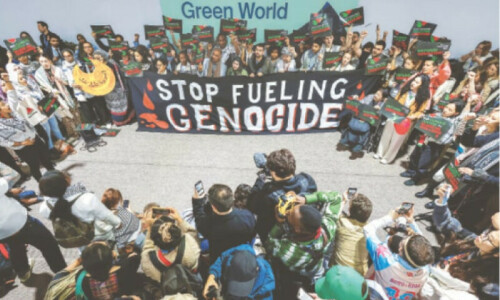Burma, or “Myanmar” as the Burmese would like democracy activist, Aung San Suu Kyi, to call it, is a country I have never visited, nor do I have any Burmese friends. My perceptions of the nation are almost wholly formed by what I read in the news and, as it turns out, by social networks. Over the past few weeks, my Twitter and Facebook contacts have been brimming over with the situation facing the Rohingya people in Burma, and attached to emails I have seen images of the dead that I never wanted to see. I did what many might do when presented with wild claims of mass murder – I searched news channels online to check what was going on. Despite everything I have ever written about Jean Baudrillard, I found myself thinking, “Well, if this dreadful news is true, it will be in the mainstream media”.
A few weeks earlier, I had been visiting the Foreign & Commonwealth Office, taking a group of Russian students on a tour. “And in this very room, we were recently delighted to welcome, Aung San Suu Kyi”, a British diplomat told us. I remembered the massive public diplomacy campaign around the Nobel Prize winner’s release that the British government had invested in during my time working there. Huge images of Aung San Suu Kyi had been projected onto the EU Parliament building. I also remembered that the remarkable lady had been on a world tour of late – thanking the “West” for their support during the time of her imprisonment. “The West”, meanwhile, has been busy taking credit for the success story that is Burma – and there is a reason for them to invest in the good news.
“Clinton’s Milestone Meeting” shouted a headline on BBC News. We are treated to a grinning photo of the US Secretary of State and a story of her meeting with Burma's President Thein Sein. The meeting was about business and the welcome news that the US had lifted trade sanctions. Even Coca-Cola attended.
This BBC piece made a mention of the treatment of the Rohingyas at least, as did the news item, “Canada announces embassy in Burma amid rush for country's oil, natural resources” – but the narrative behind the headlines and lead stories was clear. Press Freedom is another issue which, if you read the papers, appears to have been re-born in Burma. But if you dig a little deeper than “More press freedom for Burma's media” and the subtitle “Promising Period” you will see perhaps less of an overnight success. As one editor put it, "Before, we couldn't write about anything – political prisoners or human rights. Now we simply write what we want, and then the censors can decide what to cut out." Hmmm…not exactly freedom of the press.
As Aung Sang Suu Kyi is paraded through the western world, nobody seems to really care what she has to say; for example about waiting for transparency until investing in state-run oil and gas companies. The world is delighted that she is out of prison, that Burma is emerging into our notions of what democracy is, that its media is free. Now we can all make some money.
The Myanmar riots really have come at a bad time. And now the mainstream news channels are beginning to carry headlines (The New York Times was the first I found), any good news on Burma will be forced to carry the caveat of murder. Depending on what news you look at, the situation is described as ethnic cleansing, communal riots, or secular murder. The calls for a UN investigation may not strike fear into the hearts of the perpetrators, but at least after a deathly sad period there is an acknowledgement of a problem.
When my editor suggested I write something about the Rohingyas, I hesitated. Not because I don’t deeply care about the plight of fellow human beings, but because usually (and especially when writing about Pakistan) I opt for a focus on the positive. My work is ever about presenting a nation in a more balanced way. We can read a hundred articles a day on why Pakistan is a bad place. So in an attempt to balance the narrative of an overwhelming success story that is Booming Burma (as supported by the “West”) I think it is important, in this instance to draw attention to the displacement and massacre of innocent people.
The lesson for me here is that whilst a nominally-free Burma press, and increased interest in foreign news stories about Burma, may contribute to one’s perception of a nation, it is social networks that really have the power to carry the news across the waves. So, in a way, thank you for sharing those awful photographs and making me look. If there is any positive at all to draw from this, it is that with new technology and increased connectivity, it is more difficult for countries to bury their less palatable news.
Caroline Jaine is a UK based writer, artist and film-maker with a background in media strategy, training and diplomacy. Her book A Better Basra, about her time in Iraq was published in August 2011. More about Caroline’s work and her contact details can be found here and on facebook.
The views expressed by this blogger and in the following reader comments do not necessarily reflect the views and policies of the Dawn Media Group.















































